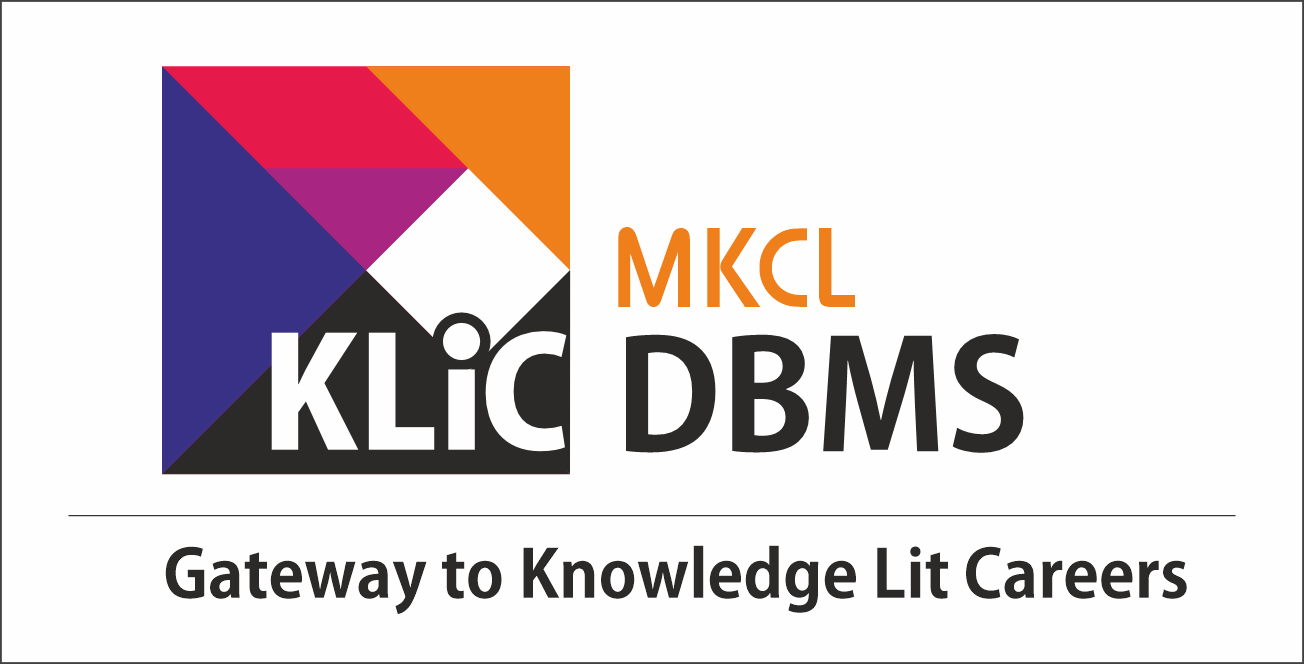- To build on foundational SQL knowledge with a focus on advanced DDL and DML operations.
- To enable students to design, implement, and optimize complex queries using nested, correlated, and set-based approaches.
- To enhance proficiency in SQL functions, joins, multi-way joins, and other relational operations for efficient data retrieval and manipulation.
- To explore data integrity, constraints, and database assertions to ensure consistency and accuracy in real-world databases.
- To develop the ability to write comprehensive and optimized queries across multi-table scenarios and large datasets.
- To provide practical exposure to views, transaction control, grouping, and aggregate logic via structured assignments and case studies.

Advanced Database Management and SQL Mastery
Work with stored procedures, triggers, indexing, and query optimization in SQL.
KLiC Certificate in Advanced Database Management and SQL Mastery
Introduction
What you'll learn ?
- Install and work with SQL Server, MySQL, and Visual Studio integrations.
- Define and manipulate databases using CREATE, UPDATE, INSERT, DELETE, and ALTER statements proficiently.
- Apply various attribute and referential integrity constraints, including CHECK, DEFAULT, and NOT NULL.
- Execute basic to complex SELECT-FROM-WHERE queries using filtering, sorting, and aliasing techniques.
- Implement and differentiate between types of joins (INNER, OUTER, LEFT, RIGHT, FULL, SELF).
- Construct and use nested queries, correlated subqueries, and multi-set comparisons.
- Utilize SQL functions (e.g., EXISTS, UNIQUE, aggregate, NULL-handling) for advanced querying.
- Develop and manage views, user roles, and access control mechanisms.
- Demonstrate practical SQL applications through library, order, and railway ticketing system schemas.
- Enforce data integrity using general assertions and explore logical pitfalls in grouping or join operations.
Syllabus
- MYSQL Installation - Demo
- Schema and Catalog Concepts in SQL
- The CREATE TABLE Command in SQL
- Attribute Data Types and Domains in SQL
- Specifying Attribute Constraints and Attribute Defaults
- Basic Retrieval Queries in SQL
- Ambiguous Attribute Names, Aliasing, Renaming and Tuple Variables
- Tables as Sets in SQL
- Order of Query Execution
- Ordering of Query Results
- Error Codes
- INSERT, DELETE, and UPDATE Statements in SQL
- Additional Features of SQL
- Create a Table Called Employee with the 2-Column Table Structure
- Create Department Table with the 2-Column Table Structure
- Queries Using DDL and DML
- Design SQL Queries for Suitable Database Application Using SQL DML Statements
- Comparisons Involving NULL and Three-Valued Logic
- Nested Queries, Tuples and Set or Multi-Set Comparisons
- Correlated Nested Queries
- Functions
- The EXISTS and UNIQUE Functions in SQL
- Explicit Sets and Renaming of Attributes in SQL
- Join - Introduction
- Cross Join
- INNER Join
- SELF Join
- LEFT OUTER Join
- RIGHT OUTER Join and FULL OUTER Join
- Join - Examples
- Join - Alternate Syntax
- Multi Way Join
- Design and Develop SQL DDL statements which demonstrate the use of SQL objects such as Table, View, Index, Sequence
- Example of a simple query on one relation- Retrieve the birth date and address of the employee
- Consider the schema for a Library Database: Write SQL queries to Retrieve details of all books in the library
- Consider the schema for an Order Database of Salesman’s: Create a view that finds the salesman who has the customer with the highest order of a day.
- Querying (using ANY, ALL, IN, Exists, NOT EXISTS, UNION, INTERSECT, Constraints etc.) - for railway ticketing
- Using NESTING OF QUERIES- Retrieve the name and address of all employees who work for the 'Research' department.
- Design at least 10 SQL queries for suitable database application using SQL DML statements: all types of Join, Sub-Query and View.
- Aggregate Functions in SQL
- Order by Clause
- Grouping
- Specifying General Constraints as Assertions in SQL
- Perform Query Using Aggregate Function
Certificate
- MKCL provides certificate (for 30/60/90 hours courses) to the KLiC learner after his/her successful course completion.
Academic Approach
The Academic Approach of the course focuses on the “work centric” education i.e. begin with work (and not from a book !), derive knowledge from work and apply that knowledge to make the work more wholesome, useful and delightful. The ultimate objective is to empower the Learner to engage in socially useful and productive work. It aims at leading the learner to his/her rewarding career as well as development of the society.
Learning methodology
- Learners are given an overview of the course and its connection to life and work.
- Learners are then exposed to the specific tool(s) used in the course through the various real-life applications of the tool(s).
- Learners are then acquainted with the careers and the hierarchy of roles they can perform at workplaces after attaining increasing levels of mastery over the tool(s).
- Learners are then acquainted with the architecture of the tool or Tool Map so as to appreciate various parts of the tool, their functions and their inter-relations.
- Learners are then exposed to simple application development methodology by using the tool at the beginner’s level
- Learners then perform the differential skills related to the use of the tool to improve the given ready-made outputs.
- Learners are then engaged in appreciation of real-life case studies developed by the experts.
- Learners are then encouraged to proceed from appreciation to imitation of the experts.
- After imitation experience, they are required to improve the expert’s outputs so that they proceed from mere imitation to emulation.
- Finally, they develop the integral skills involving optimal methods and best practices to produce useful outputs right from scratch, publish them in their ePortfolio and thereby proceed from emulation to self-expression.
Evaluation Pattern
Evaluation Pattern of KLiC Courses consists of 4 Sections as per below table:
| Section No. | Section Name | Total Marks | Minimum Passing Marks |
|---|---|---|---|
| 1 | Learning Progression | 25 | 10 |
| 2 | Internal Assessment | 25 | 10 |
| 3 | Final Online Examination | 50 | 20 |
| Total | 100 | 40 | |
| 4 | SUPWs (Socially Useful and Productive Work in form of Assignments) | 5 Assignments | 2 Assignments to be Completed & Uploaded |
MKCL’s KLiC Certificate will be provided to the learner who will satisfy the below criteria:
- Learners who have successfully completed above mentioned 3 Sections i.e. Section 1, Section 2 and Section 3
- Additionally, learner should have completed Section 4 (i.e. Section 4 will comprise of SUPWs i.e. Socially Useful and Productive Work in form of Assignments)
- Learner has to complete and upload minimum 2 out of 5 Assignments
Courses Fee Structure from 01 July, 2025 Onwards
KLiC 30 hour course fee applicable from 01 July, 2025 all over Maharashtra| KLiC Course Duration | MFO: MKCL Share (Including 18% GST) |
ALC Share (Service Charges to be collected by ALC) |
|---|---|---|
| 30 hours | Rs. 300/- | Rs. 1,500/- |
Important Points:
* Above mentioned fee is applicable for all Modes of KLiC Courses offered at Authorised Learning Center (ALC) and at Satellite Center
* Total fee is including of Course fees, Examination fees and Certification fees
* MKCL reserves the right to modify the Fee anytime without any prior notice
* Above mentioned fee is applicable for all Modes of KLiC Courses offered at Authorised Learning Center (ALC) and at Satellite Center
* Total fee is including of Course fees, Examination fees and Certification fees
* MKCL reserves the right to modify the Fee anytime without any prior notice
